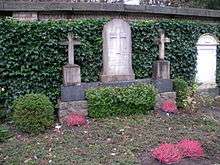Johanna Spyri
| Johanna Louise Heusser | |
|---|---|
 Johanna Spyri, about 1870 | |
| Born |
12 June 1827 Hirzel, Switzerland |
| Died |
7 July 1901 (aged 74) Zürich, Switzerland |
| Occupation | Short story writer, Novelist |
| Genre | Children's literature, Adult literature |
| Notable works | Heidi |
Johanna Louise Spyri (née Heusser; German: [joˈhana ˈʃpiːri]; 12 June 1827 – 7 July 1901) was a Swiss-born author of novels, notably children's stories, and is best known for her book Heidi. Born in the rural area of Hirzel, Switzerland, as a child she spent several summers in the area around Chur in Graubünden, the setting she later would use in her novels.
Biography
In 1852, Johanna Heusser married Bernhard Spyri. Bernhard was a lawyer. Whilst living in the city of Zürich she began to write about life in the country. Her first story, A Note on Vrony's Grave, which deals with a woman's life of domestic violence, was published in 1880; the following year further stories for both adults and children appeared, among them the novel Heidi, which she wrote in four weeks. Heidi is the story of an orphan girl who lives with her grandfather in the Swiss Alps, and is famous for its vivid portrayal of the landscape.
Her husband and her only child, named Bernard, both died in 1884. Alone, she devoted herself to charitable causes and wrote over fifty more stories before her death in 1901. She was interred in the family plot at the Sihlfeld-A Cemetery in Zürich. An icon in Switzerland, Spyri's portrait was placed on a postage stamp in 1951 and on a 20 CHF commemorative coin in 2009.

In April 2010 a professor searching for children's illustrations found a book written in 1830 by a German history teacher, Hermann Adam von Kamp, that Johanna may have used as a basis for Heidi. The 1830 story is titled Adelheide - das Mädchen vom Alpengebirge—translated, "Adelaide, the girl from the Alps". The two stories share many similarities in plot line and imagery. Spyri biographer Regine Schindler said it was entirely possible that Johanna may have been familiar with the story as she grew up in a literate household with many books.[1]
Bibliography
The following is a list of her main books:
- Heidi (1880)
- Cornelli (1892)
- Erick and Sally (1921)
- Gritli's Children (1885)
- Mäzli (1921)
- Moni the Goat-Boy (1897)
- Rico and Wiseli (1885)
- The Story of Rico (1882)
- Toni, the Little Woodcarver (1920)
- Uncle Titus and His Visit to the Country (1913)
- Veronica And Other Friends (1886)
- What Sami Sings with the Birds (1917)
Her books were originally written in German. The translations into English at the end of the 19th century, or the early 1900s, mention H. A. Melcon (1839-1910), Marie Louise Kirk (1860-1936), Emma Stelter Hopkins, Louise Brooks, Helen B. Dole and the couple Charles Wharton Stork and Elisabeth P. Stork.
References
External links
-
 Works written by or about Johanna Spyri at Wikisource
Works written by or about Johanna Spyri at Wikisource -
 Media related to Johanna Spyri at Wikimedia Commons
Media related to Johanna Spyri at Wikimedia Commons - Works by Johanna Spyri at Project Gutenberg
- Works by or about Johanna Spyri at Internet Archive
- Works by Johanna Spyri at LibriVox (public domain audiobooks)

- Works by Johanna Spyri at Classicreader.com